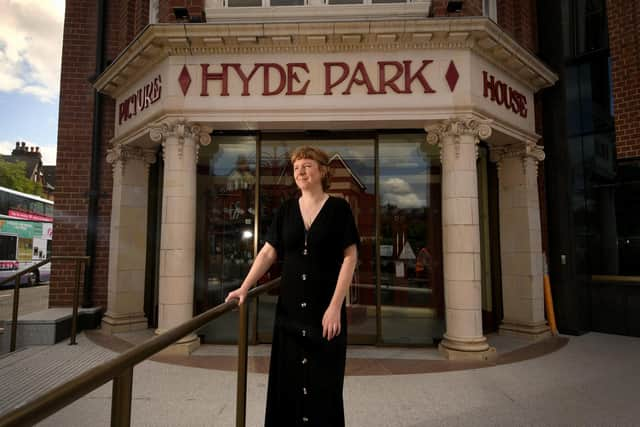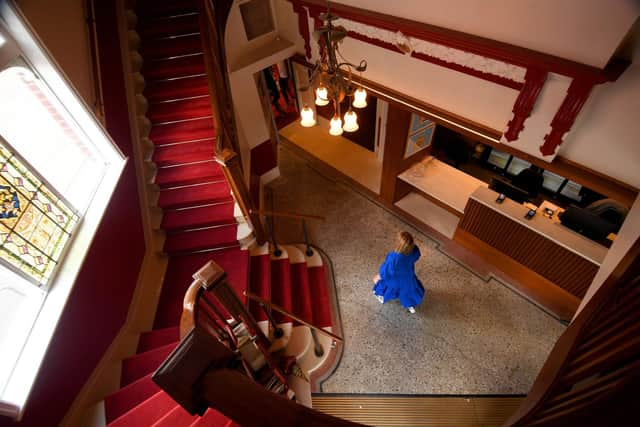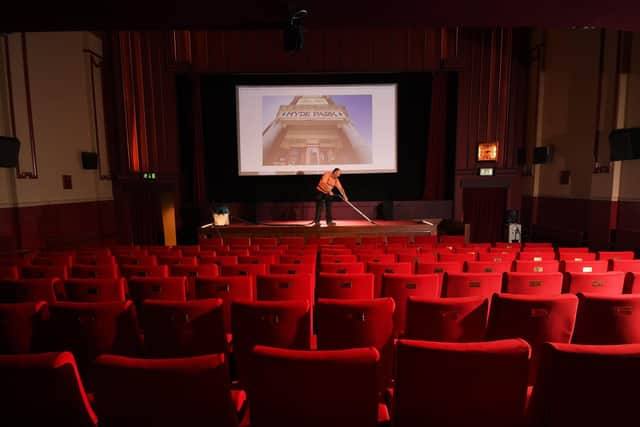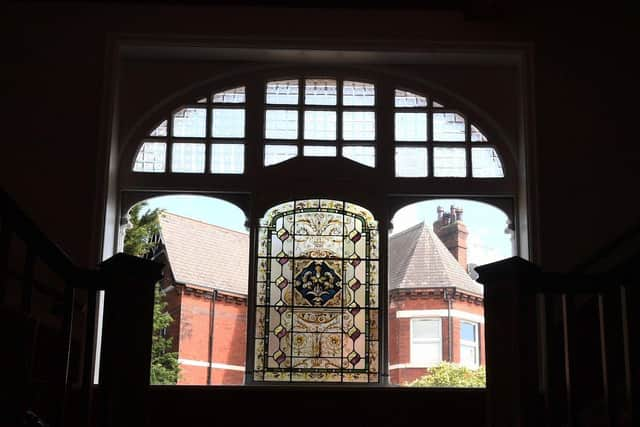Hyde Park Picture House: Gas-lit cinema to reopen after three years with Wes Anderson's Asteroid City
It lays claim to being the last gas-lit cinema in the UK, and possibly the world, but has come to mean so much more - a cherished local sanctuary regarded, along with the nearby Brudenell Social Club, as a defining landmark in the community.
But old buildings, beloved as they are, often present problems. While many felt a trip to the Picture House was a cosy, home-away-from-home experience before it closed in March 2020, wheelchair users couldn’t get up the steps to the entrance.
Advertisement
Hide AdAdvertisement
Hide AdChange was needed, and the idea of properly restoring the cinema really gained momentum amid celebrations for its centenary in 2014, although an earlier feasibility study took place way back in 2005.


“We were at the edge of what we could achieve, with the facilities that we had, with a building that is beautiful but was bursting at the seams,” says head of cinema Wendy Cook, speaking to a small gathering during a press event on Monday.
That was both “literally” and in the sense that it could offer so much more to the community, but only with some improvements.
Wendy says that between 2004 and 2014, the cinema’s audience doubled from about 32,000 a year to 60,000. She wanted to offer great experiences but would see the audience “battle with the building”.
Advertisement
Hide AdAdvertisement
Hide AdOne example, she says, was during baby-friendly screenings. “To do that, we had to put a temporary baby changing table in the foyer and people just went with it, they just accepted it, and people would park all their prams at the front of the stage.”


The National Lottery Heritage Fund helped with £2.6m to support the 109-year-old cinema carry out £4.8m of works, including repairs to its façade and the trademark lamppost, the restoration of original terrazzo flooring, and the refurbishment of its nine gas lights, which will be lit for every screening.
The Picture House Project, which received funding organisations including Leeds City Council and the Garfield Weston Foundation as well, has also introduced new accessible facilities like a ramped entrance, a more spacious café bar, community room - visitors will notice the building has been extended on the Brudenell Road side - platform lift and wheelchair accessible toilet.
It was a daunting prospect for Mark Johnston, the architect from the firm Page\Park who led the restoration.
Advertisement
Hide AdAdvertisement
Hide Ad“It's a beautiful building to start with and nobody wants to be the architect who ruins a beautiful historic building,” he says.


After coming on board, he became “obsessed” with the cinema.
“From day one, I immediately understood why people love the Picture House. And I think because this has been my main project for years now, I've been working on this for about five years and, as each day goes by, I find something new about the building that I didn't realise before.”
Firstly, the gas lights needed preserving: the old piping was not fit for purpose, so had to be replaced, and they were also made tamper-proof.
Advertisement
Hide AdAdvertisement
Hide AdOutside, some of the glazed faience blocks along the bottom the ‘Hyde Park Picture House’ sign over the entrance had cracked due to structural movements, so Darwen Terracotta in Blackburn produced exact replicas.


Mark says that it is hard to point at any part of the building that has not in some way been restored, but other work includes stone repairs, brick repointing, the replacement of around half the roof slating and the installation of new rainwater pipes.
“It is cherished locally and nationally by so many people, it's got a really strong community,” says Mark. “So we were very aware of, and cautious of, removing any aspects that people loved about the Picture House. We desperately tried to keep that cosiness and that feeling of warmth and welcoming into the Picture House. We didn't want to sterilise that at all, so I'm hoping we've achieved that.”
Mark says, though, it would be unacceptable for a building like this to only offer a stepped entrance today, and accessibility was put at the heart of the project.
Advertisement
Hide AdAdvertisement
Hide Ad“That's always been the tagline of the project: how do we make this a cinema for all?”
On the extension, builders have articulated some of the brick work to be a reference to 35 millimetre film reels, which becomes most clear when the sun shines.
“It's really an homage to the fact that the Picture House has been a cinema for over 100 years uninterrupted. Many heritage cinemas in the country have been demolished or converted into bingo halls.
“It's also a nod to the heritage of Leeds as a city, being the birthplace of motion film with Louis le Prince.”
Advertisement
Hide AdAdvertisement
Hide AdHowever, the cinema is not quite finished. A new 50-seat second screen located in the basement, for example, will open in July.
They were “ready to be back,” says Wendy. “We decided we’ll just crack on. Why not have an opening with most of the cinema done? I think, hopefully, most of our audience will probably see that’s a Hyde Park Picture House thing to do.”
It is a big moment for Wendy, from Rothwell, whose love of film goes back to watching Hollywood classics with her grandparents while they babysat her. Her father also introduced her to Westerns and sci-fi and, later, she would stay up at night watching the likes of Wong Kar-wai’s Fallen Angels and Lars von Trier’s Breaking the Waves on the television.
Eventually she worked at a multiplex in Leeds’s old Warner Village, but while studying fine art at what is now Leeds Beckett University, she got a job at Hyde Park aged about 20.
Advertisement
Hide AdAdvertisement
Hide Ad“I would watch two films a night, every night, sell sweets and then, thankfully, someone didn't turn up for work. So I was able to progress and become a ticket seller, which is how it used to happen. And then a couple of years later, when I graduated, the manager at the time was thinking about moving on and they started to show me how it worked, talked me through the opportunities of the role and I was very lucky, basically, that I was able to start managing this when I had just graduated from university.”
Now 40, and having overseen a monumental change in the cinema’s history, she says: “I'm really excited to prove to our audience that we will use this opportunity wisely. So I'm kind of both relieved and also gearing up for the next battle.”
There are people who have been visiting the cinema for 50 years and have a “strong, deep connection” some of whom were brought in to share their perspectives during the transformation.
Wendy says: “We've not won over everyone, but I'm pleased with the people who have come with us on it. There are particular customers in my mind. There's one particular woman, who I adore, and I want to be the best cinema for her.
Advertisement
Hide AdAdvertisement
Hide Ad“That's been one of the things that kept me going through the project. Because it's not really possible with a project like this to make everyone happy, but if you keep a focus on ‘well, I can serve this particular person, or this particular community, or this particular thing can be improved’, then that feels like an achievement.”
Over the last three years the cinema has been ‘on tour’, working with other organisations around Leeds to put on screenings and building relationships which can continue after the reopening.
The closure lasted longer than expected - not least because of the interruptions caused by the Covid-19 pandemic, when work paused for about a year from April 2020 - but they are now excited to have people back watching films.
And there will be plenty to see. Robb Barham, operations and programmes manager, says that before the closure the cinema was showing around 370 different films each year and thinks the second screen will mean they can roughly double that amount.
As ever, its programme will be varied.
Advertisement
Hide AdAdvertisement
Hide AdTonight, Wes Anderson’s Asteroid City will be the first screening, while the much-anticipated Barbie is coming late next month.
On July 4, there will be a preview screening of new Dutch documentary Shabu, accompanied by a director Q&A with Shamira Raphaëla, launching the cinema’s weekly documentary strand Tuesday Wonders.
Then a season of films in partnership with Leeds International African Arts Festival will start from July 11 as part of the Picture House’s new Cinema Africa! celebration of the best new film from that continent.
A screening of Yorkshire film Brassed Off, featuring a Q&A with director Mark Herman, will take place on July 30 to start the cinema’s new “classics” screenings, reRUN.
Advertisement
Hide AdAdvertisement
Hide AdDuring the reopening week, the Picture House is also holding open days, where audiences are invited to visit the cinema, explore the new and refurbished spaces, enjoy free films on the big screen and see archive material up close in the community room.
Old favourite events such as the child-friendly Hyde & Seek and Bring Your Own Baby will be back, while the Creatures of the Night midnight movies return too.
Robb, it seems, is ready to go.
“This has been coming for 100 years - why not milk it?”
For more information and to book, visit www.hpph.co.uk